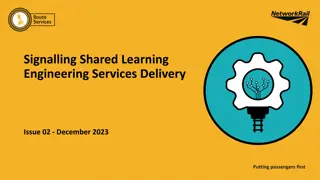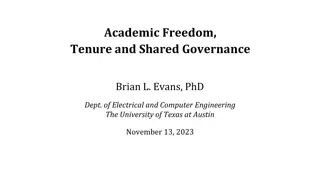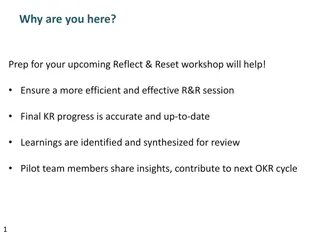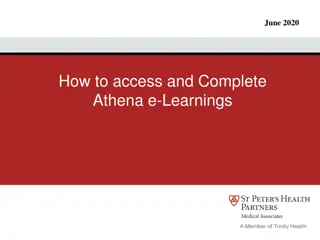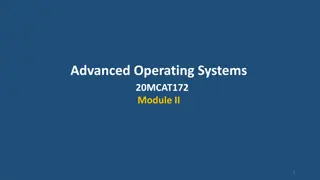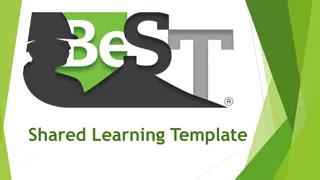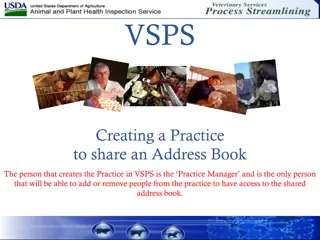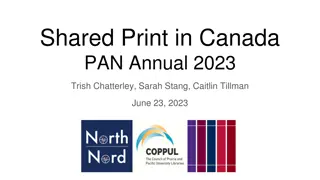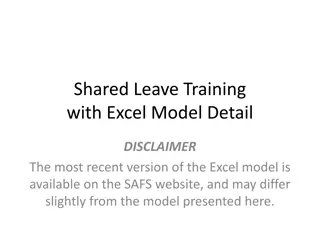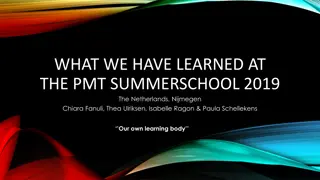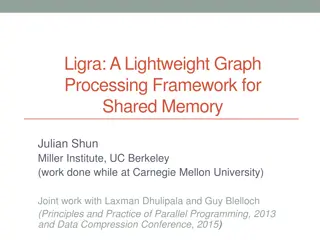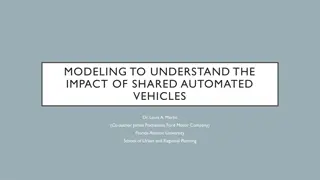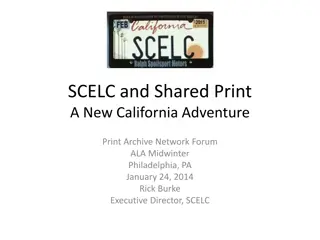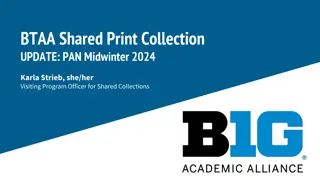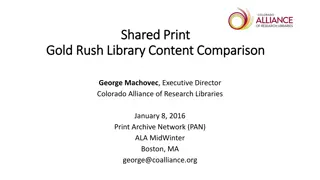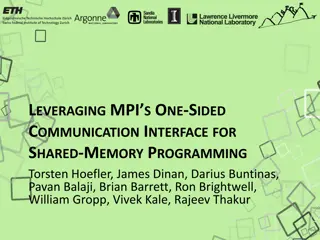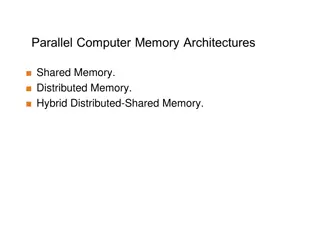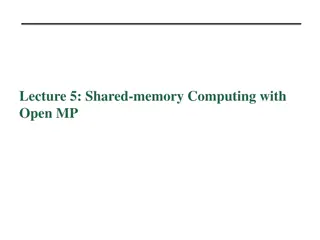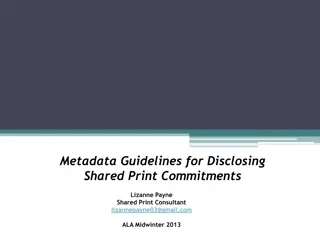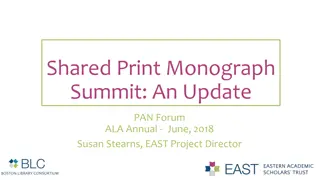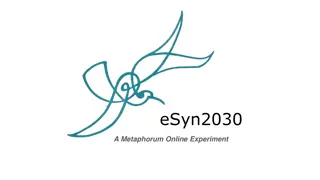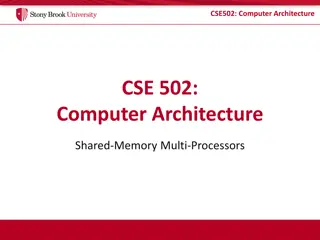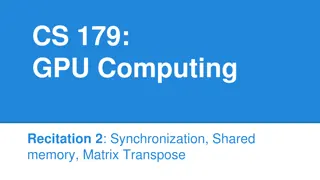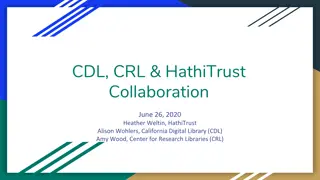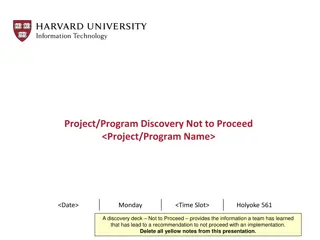Engineering as Social Experimentation: Importance and Learnings
Engineering as social experimentation involves engineers conducting experiments and tests at various stages of product or process design to evaluate outcomes and make necessary modifications. This process is crucial for innovation and improvement in the field of engineering, emphasizing the importan
0 views • 50 slides
Signalling Shared Learning Report - December 2023
This report highlights key incidents and learnings from Signalling Projects between July 2023 and December 2023. It emphasizes the importance of safety measures to prioritize passenger well-being. The 35th-anniversary reflection on the Clapham Disaster serves as a stark reminder of the consequences
2 views • 10 slides
Understanding the Evolution and Importance of SDH Technology
Explore the journey of Synchronous Digital Hierarchy (SDH) technology from its inception to modern advancements. Uncover key learnings, user preferences, potential challenges, and technological approaches to ensure SDH performance. Discover how SDH continues to play a vital role in telecom networks
2 views • 22 slides
World Patient Safety Day 2023: Engaging Patients for Patient Safety
World Patient Safety Day 2023 emphasizes engaging, raising, advocating, and empowering patients for safety in healthcare. Major activities include taking the pledge of "First Do No Harm," promoting patient safety at Health Mela events, recognizing safety champions, and sharing innovative learnings.
6 views • 15 slides
Learnings from Surah Al-e-Imran: Guidance, Revelation, and Resurrection
Surah Al-e-Imran holds lessons about Allah's guidance, the importance of following His revelations like the Torah and Gospel, and the realization that worldly possessions hold no value in the Hereafter. Through the Battle of Badr, believers are urged to reflect on the power and mercy of Allah. The s
5 views • 35 slides
Importance of Academic Freedom, Tenure, and Shared Governance in Higher Education
Academic freedom, tenure, and shared governance are crucial in higher education for fostering open inquiry, protecting faculty rights, and ensuring institutional integrity. Organizations like the American Association of University Professors (AAUP) advocate for these principles to uphold faculty aut
5 views • 9 slides
Efficient Reflect & Reset Strategies for Successful OKR Cycles
Prepare for your upcoming Reflect & Reset workshop to ensure a more efficient and effective OKR session. Learn strategies to accurately track progress, identify key learnings, and involve your team members for a successful OKR cycle. Understand the critical steps of defining objectives and key resul
0 views • 16 slides
Understanding Cladograms and Phylogenetic Analysis
Cladograms are used in cladistics to illustrate evolutionary relationships between organisms based on shared ancestral and derived characters. They are created by grouping species by common descent, forming clades that include an ancestral species and all its descendants. Valid clades are monophylet
0 views • 11 slides
Accessing and Completing Athena e-Learnings with Ease
Learn how to access Athena e-Learnings efficiently through clear step-by-step instructions. Follow the provided guidance to navigate through the Athenahealth Learning Portal, register for courses, complete modules, and evaluate your progress. Utilize the provided resources for a smooth learning expe
0 views • 8 slides
Understanding Distributed Mutual Exclusion in Operating Systems
In distributed systems, the problem of mutual exclusion arises when multiple sites/processes need to access shared resources concurrently. Unlike in single-computer systems, distributed systems lack shared memory, leading to the need for communication-based approaches rather than shared variables li
0 views • 49 slides
Understanding Shared Memory Architectures and Cache Coherence
Shared memory architectures involve multiple CPUs sharing one memory with a global address space, with challenges like the cache coherence problem. This summary delves into UMA and NUMA architectures, addressing issues like memory latency and bandwidth, as well as the bus-based UMA and NUMA shared m
0 views • 27 slides
Enhancing Organizational Learning through BeSafe Taranaki Shared Learnings
BeSafe Taranaki Shared Learnings aims to facilitate cross-organizational learning by sharing insights from incidents and investigations. The focus is on identifying key lessons, target audiences, necessary process changes, and safety expectations. Two types of learnings are emphasized: Immediate Not
2 views • 9 slides
Creating a Shared Address Book in VSPS
Learn how to create a shared address book in VSPS by setting up a practice managed by the Practice Manager, who can add or remove users to access the address book. Follow step-by-step instructions to invite users and manage access to the shared address book efficiently.
0 views • 24 slides
Understanding Shared Memory Architectures and Cache Coherence
Shared memory architectures involve multiple CPUs accessing a common memory, leading to challenges like the cache coherence problem. This article delves into different types of shared memory architectures, such as UMA and NUMA, and explores the cache coherence issue and protocols. It also highlights
2 views • 27 slides
Shared Living Service Overview for Independent Living with Supports
The Shared Living Service, facilitated by Deanna L. Parker, MPA VA DBHDS, offers individuals aged 18 and above the opportunity to live independently with some support. This service is available under all three waivers and entails a one-to-one living arrangement where a roommate provides agreed-upon
0 views • 20 slides
Collaborative Shared Print Initiatives in Canadian Libraries: PAN Annual 2023
North/Nord initiative began in August 2021 to coordinate shared print efforts across Canadian libraries, focusing on Canadian materials. The program evaluation is set for Summer 2023, emphasizing collaboration for success. COPPUL SPAN expands on prioritizing partnerships, Indigenous publications, an
3 views • 5 slides
Understanding Citizenship: A Shared Identity and History
Explore the diverse perspectives on citizenship through respectful devotion to one's country or school. Discover what citizenship means to individuals in just six words and how it ties into shared histories and identities. Delve into the American Dream and the shared privilege it represents, emphasi
0 views • 18 slides
Strategies and Learnings from SQA Information Evening 2020
This document outlines the insights and actions shared during the SQA Information Evening on October 28th, 2020. It covers the aims of sharing 2020 learnings, communicating current SQA arrangements, and supporting fair certification. Topics include gathering evidence, developing autonomy, and tracki
0 views • 27 slides
Excel Model for Shared Leave Training Detail
The Excel model for shared leave training detail allows school district employees to share leave both within and outside their district. The model facilitates the calculation of hourly salary rates and benefits for employees interested in participating in the shared leave program. The implementation
0 views • 12 slides
Insights from PMT Summerschool 2019 in Nijmegen
Discover the diverse learnings and experiences shared by Chiara Fanuli, Thea Ulriksen, Isabelle Ragon, and Paula Schellekens at the PMT Summerschool 2019 in Nijmegen, The Netherlands. From exploring new forms of therapy treatments to discussing differences in treatment approaches and personal growth
0 views • 9 slides
Effective Strategies for Shared Reading in Non-Fiction Settings
Shared reading in non-fiction is an effective approach to reinforce literacy skills while teaching subject-specific content. Teachers choose texts that match students' reading levels, are cross-curricular, and engaging. Discussions, predictions, vocabulary exploration, and historical context are int
0 views • 22 slides
Ultimate as a Tool for Promoting Active, Healthy Living in First Nation Communities
Context: The use of Ultimate as a tool in promoting active, healthy living in First Nation communities is highlighted. Emphasis is placed on the benefits such as being inexpensive, fun, and promoting physical activity and chronic disease prevention. Like-minded principles and observations from engag
0 views • 14 slides
Reciprocal Coaching Framework for Professional Development
The Reciprocal Coaching Framework, adapted in 2024 by Vinci Daro in collaboration with educators from several school districts, emphasizes setting goals, identifying teaching actions, and collecting artifacts to facilitate a structured coaching process. Partnerships are established, individual goals
0 views • 27 slides
Ligra: A Lightweight Graph Processing Framework for Shared Memory
Ligra is a lightweight graph processing framework developed by Julian Shun during his time at the Miller Institute, UC Berkeley. This framework, created in collaboration with Laxman Dhulipala and Guy Blelloch, is designed for shared memory systems to efficiently analyze large graphs. Key features in
0 views • 21 slides
Introduction to Boston University's Shared Computing Cluster
Boston University's Shared Computing Cluster (SCC) provides researchers with access to a high-performance computing environment for running code, collaborating on shared data, and utilizing specialized software packages. With over 800 nodes, 20,000 processors, and hundreds of GPUs, the SCC offers re
0 views • 63 slides
Impact of Shared Automated Vehicles on Transportation System Performance
This study by Dr. Louis A. Merlin and James Fischelson explores the potential impact of shared automated vehicles on transportation systems. By reviewing 39 papers and simulations, the research delves into the implications of new shared automated modes, such as automated taxis, shuttles, and shared
0 views • 38 slides
SCELC Shared Print Feasibility Study Overview
Explore the goals and challenges of the SCELC Shared Print Feasibility Study, focusing on understanding member readiness, collection analysis, sustainability proposals, user behaviors, and cost analysis. The study aims to develop shared print programs to preserve and share print materials among dive
0 views • 12 slides
Transforming Big Ten Libraries through Shared Print Collections and Collective Action
Aspiration for a tremendous vision to unite Big Ten university collections into one shared and fully networked "BIG Collection." This initiative aims to increase findability, usability, and value at scale while deepening interdependence and resilience for an uncertain future. The Knowledge Commons w
1 views • 10 slides
Debate on Shared Sanitation: Improved or Not?
The discussion revolves around the classification of shared sanitation as improved or unimproved. WHO and UNICEF have a classification system where shared sanitation is considered unimproved due to concerns about cleanliness and accessibility. A proposed policy change by JMP seeks to include shared
0 views • 22 slides
Alliance Shared Print Program Overview
Colorado Alliance of Research Libraries established the Alliance Shared Print program focusing on distributed print repositories. The program allows libraries to voluntarily participate, maintain their holdings, and retain materials on behalf of the group. Key features include flexibility, no centra
0 views • 21 slides
Leveraging MPI's One-Sided Communication Interface for Shared Memory Programming
This content discusses the utilization of MPI's one-sided communication interface for shared memory programming, addressing the benefits of using multi- and manycore systems, challenges in programming shared memory efficiently, the differences between MPI and OS tools, MPI-3.0 one-sided memory model
0 views • 20 slides
Understanding Shared Memory, Distributed Memory, and Hybrid Distributed-Shared Memory
Shared memory systems allow multiple processors to access the same memory resources, with changes made by one processor visible to all others. This concept is categorized into Uniform Memory Access (UMA) and Non-Uniform Memory Access (NUMA) architectures. UMA provides equal access times to memory, w
0 views • 22 slides
Shared-Memory Computing with Open MP
Shared-memory computing with Open MP offers a parallel programming model that is portable and scalable across shared-memory architectures. It allows for incremental parallelization, compiler-based thread program generation, and synchronization. Open MP pragmas help in parallelizing individual comput
0 views • 25 slides
Metadata Guidelines for Disclosing Shared Print Commitments
Shared Print Metadata Guidelines aim to establish new Shared Print Institution Symbols and add them to bibliographic records for resource sharing. These guidelines involve creating MARC Local Holdings Records (LHRs) to document archiving commitments for journals. The Shared Print initiative supports
1 views • 12 slides
Shared Print Monograph Summit: Progress and Future Directions
The Shared Print Monograph Summit held in June 2018 focused on collaboration and coordination among North American shared print programs. Key priorities included open data on retention commitments, research on risks, establishing community standards, and more. Working groups were formed to address o
0 views • 24 slides
eSyn 2030 Online Experiment: Exploring Collaborative Learning
Explore the experimental online event eSyn 2030, inspired by Beer's Team Syntegrity methodology, to facilitate effective collaboration and collective problem-solving. Join the organizing team in experiencing the protocol to address pressing societal challenges. The event involves a unique structure
0 views • 21 slides
Understanding Computer Architecture: Shared Memory Systems
Shared memory multiprocessors in computer architecture involve multiple threads using shared memory for communication, with synchronization complexities and implicit communication challenges. Despite these drawbacks, Shared Memory Systems have proven to be successful machines due to their evolutiona
0 views • 40 slides
Synchronization and Shared Memory in GPU Computing
Synchronization and shared memory play vital roles in optimizing parallelism in GPU computing. __syncthreads() enables thread synchronization within blocks, while atomic instructions ensure serialized access to shared resources. Examples like Parallel BFS and summing numbers highlight the need for s
0 views • 21 slides
Collaboration for Shared Print Collections: Vision, Mission, and Principles
This collaboration between HathiTrust, CDL, and CRL aims to enhance access to shared print collections, promote equity in scholarly resources, and leverage networks for collaborative infrastructure. The vision includes embedding shared print in library collections, enriching the scholarly record, an
0 views • 10 slides
Project Discovery Not to Proceed Overview
This presentation outlines the findings of the Discovery phase for a project/program, detailing the reasoning for not moving forward with implementation at this time. It covers the purpose, intended outcome, problem statement, scope considerations, impact analysis, and key learnings. The goal is to
1 views • 9 slides

